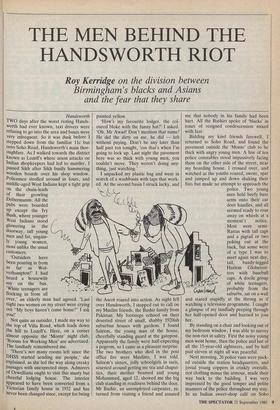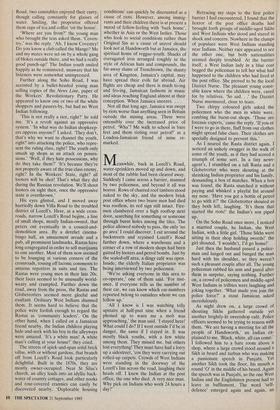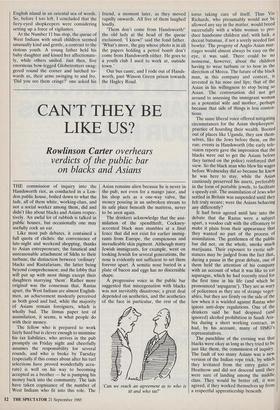THE MEN BEHIND THE HANDSWORTH RIOT
Roy Kerridge on the division between
Birmingham's blacks and Asians and the fear that they share
Handsworth TWO days after the worst rioting Hands- worth had ever known, taxi drivers were refusing to go into the area and buses were very infrequent. So it was dusk before I stepped down from the familiar 11c bus onto Soho Road, Handsworth's main thor- oughfare. As I walked towards the district known as Lozell's where arson attacks on Indian shopkeepers had led to murder, I passed Sikh after Sikh busily hammering wooden boards over his shop window. Policemen strolled around in fours, and middle-aged West Indians kept a tight grip on the chain-leads of their growling Dobermanns. All the pubs were boarded up except the Ivy Bush, where younger West Indians stood glowering in the doorway, tall young men and fat, ungain- ly young women, most unlike the usual customers.
Not quite an outsider, I made my way to the top of Villa Road, which leads down the hill to Lozell's. Here, on a corner almost opposite the 'Monte' night club, 'Rooms for Working Men' are advertised. The landlady remembered me.
'There's not many rooms left since the DHSS started sending me people,' she explained, as she led the way along creaky passages with unexpected steps. Admirers of Orwelliana ought to visit this musty but cheerful lodging house. The interior appeared to have been converted from a Victorian family house in 1932 and has never been changed since, except for being painted yellow.
`How's my favourite lodger, the col- oured bloke with the funny hat?' I asked. 'Oh, Mr Awad! Don't mention that name! He did the dirty on me, he did — left- without paying. Don't be any later than half past ten tonight, 'cos that's when I'm going to lock up. Last night the pavement here was so thick with young men, you couldn't move. They weren't doing any- thing, just watching.'
I unpacked my plastic bag and went in search of a washbasin with taps that work- ed. At the second basin I struck lucky, and the Ascot roared into action. As night fell over Handsworth, I stepped out to call on my Muslim friends, the Bashir family from Pakistan. My footsteps echoed on their deserted street of small, shabby 1920ish suburban houses with gardens. I found Saleem, the young man of the house, cheerfully standing guard at the gatepost. Apparently the family were half-expecting a pogrom, so I came as a pleasant surprise. The two brothers who died in the post office fire were Muslims, I was told. Saleem's sisters, jolly schoolgirls in saris, scurried around getting me tea and chapat- ties, their mother beamed and young Mohammed, aged 12, showed me the big club standing in readiness behind the door. Mr Bashir, an unemployed carpenter, re- turned from visiting a friend and assured me that nobody in his family had been hurt. All the Bashirs spoke of 'blacks' in tones of resigned condescension mixed with fear.
Bidding my kind friends farewell, I returned to Soho Road, and found the pavement outside the 'Monte' club to be thick with angry young men. A line of ten police constables stood impassively facing them on the other side of the street, near my boarding house. I crossed over, and watched as the youths roared, swore, spat and jumped up and down shaking their fists but made no attempt to approach the police. Two young men held beefy bare arms onto their car door handles, and all seemed ready to roar away on wheels at a By standing on a chair and looking out of my bedroom window, I was able to survey the non-riot in safety. First the noisy young men went home, then the police and last of all the 15-year-old sightseers, and by half past eleven at night all was peaceful.
Next morning, 26 police vans were pack- ed outside the station headquarters, and jovial young coppers in crinkly overalls, riot clothing minus the armour, made their way back to the building. I was very impressed by the good temper and polite manners of the police throughout my stay. In an Indian sweet-shop cafe on Soho Road, two constables enjoyed their curry, though calling constantly for glasses of water. Smiling, the proprietor offered them cups of tea and coffee 'on the house'.
`Where are you from?' the young man who brought the teas asked them. 'Coven- try,' was the reply. `Ah, I know Coventry! Do you know a club called the Mango? Me and my mates were set on by a whole gang of blokes outside there, and we had a really good punch-up!' The Indian youth smiled happily as he reminisced, unaware that his listeners were somewhat unimpressed.
Further along the Soho Road, I was accosted by a bullet-headed young man selling copies of the News Line, paper of the Workers' Revolutionary Party. He appeared to know one or two of the white shoppers and passers-by, but had no West Indian following.
`This is not really a riot, right?' he told me. 'It's a revolt against an oppressive system.' In what way do Indian shopkeep- ers oppress anyone?' I asked. 'They don't, that's why we want to channel the youth, right? into attacking the police, who repre- sent the ruling class, right? The youth only smash up shops as an attack on posses- sions."Well, if they hate possessions, why do they take them?' It's because they're not properly aware of the true class enemy, right? In the Workers' State, right? all looters will he shot! That's what they did during the Russian revolution. We'll shoot looters on sight then, once the oppressive state is overthrown.'
His eyes glinted, and I moved away hurriedly down Villa Road to the troubled district of Lozell's. Here, at a wide cross- roads, narrow Lozell's Road begins, a line of small shops, mostly Indian-owned, that peters out eventually in a council-and- demolition area. By a derelict cinema- bingo hall, an amusement arcade and a pub, all prominent landmarks, Rastas have long congregated in order to sell marijuana to one another. Most of them now seemed to be lounging at various corners of the crossroads, tossing off laconic comments to anxious reporters in suits and ties. The Rastas were young men in their late 20s; their faces seemed to be unusually world- weary and crumpled. Further down the road, away from the press, the Rastas and Globetrotters seemed more gleeful and exultant. Ordinary West Indians shunned them. It seems hard to believe that the police were foolish enough to regard the Rastas as 'community leaders'. On the other hand, when I called on a Jamaican friend nearby, the Indian children playing hide-and-seek with his boy in the alleyways were amazed. 'It's a white man! A white man's calling at your house!' they cried.
The streets of spick-and-span solid brick villas, with or without gardens, that branch off from Lozell's Road look particularly delightful. Built in the 1870s, they are mostly owner-occupied. Near St Silas's church, an alley leads into an idyllic back- water of country cottages, and other nooks and rose-covered crannies can easily be discovered nearby. 'Deplorable housing conditions' can quickly be discounted as a cause of riots. However, among immig- rants and their children there is at present a mood of fellow-feeling with 'back home', whether in Asia or the West Indies. Those who look to social conditions rather than Original Sin as a cause of unrest should look not at Handsworth but at Jamaica, the spiritual home of reggae-youth. Shacks of corrugated iron arranged roughly in the style of African huts and compounds, the far-away slums of Trenchtown, the shanty area of Kingston, Jamaica's capital, may have spread their evils far abroad, Air flights are cheap and there is much to-ing and fro-ing, Jamaican fashions in music and ideas reaching England almost at their conception. When Jamaica sneezes... .
Not all that long ago, Jamaica was swept by riots worse than anything seen in Britain outside the mining areas. These were ostensibly over the increased price of petrol. 'Wha'? Me walk to school in bare feet and them rioting over petrol!' as a London-Jamaican friend of mine re- marked.
Meanwhile, back in Lozell's Road, water-sprinklers moved up and down, and most of the rubble had been cleared away. Suddenly I came across a barrier, manned by two policemen, and beyond it all was horror. Rows of charred roof timbers stood naked to the sky, and the modern brick post office where two brave men had died was roofless, its red sign still intact. Fire- men clambered over a high rooftop next door, searching for something or someone through burnt holes among the tiles. The police allowed nobody to pass, the only `no go area' I could discover. I cut around the backstreets and rejoined Lozell's Road further down, where a warehouse and a corner of a row of modern shops had been gutted by looters and petrol bombs. Just by the sealed-off area, a dingy cafe was open. Inside, the elderly Italian proprietor was being interviewed by two policemen.
`We're asking everyone in this area to co-operate,' one of them said. 'For inst- ance, if everyone tells us the number of their car, we can know which car-numbers reported belong to outsiders whom we can follow up.'
`All I know is I was watching telly upstairs at half-past nine when a friend phoned up to warn me a mob was approaching,' the man said. 'I stayed here! What could I do? If I went outside I'd be in danger, the same if I stayed in. It was mostly black youths, with a few white among them. They missed me, but others lost everything! They must have had a lorry up a sidestreet, 'cos they were carrying out rolled-up carpets. Crowds of West Indians were standing in the doorway of the Lozell's Inn across the road, laughing their heads off. I knew the Indian at the post office, the one who died. A very nice man. Why pick on Indians who work 24 hours a day?' Retracing my steps to the first police barrier I had encountered, I found that the horror of • the post office deaths had brought forth groups of middle-aged Sikhs and West Indians who stood and stared in shock and concern. Nowhere in the clumps of populace were West Indians standing near Indians. Neither race appeared to see the other one, but both nationalities seemed deeply troubled. At the barrier itself, a West Indian lady in a blue coat begged the policeman to tell her what had happened to the children who had lived at the post office. She proved to be the local District Nurse. The pleasant young const- able knew where the children were, cared for by relatives. `So sad. . .' the District Nurse murmured, close to tears.
Two chirpy coloured girls asked the policemen who the men in white were, combing the burnt-out shops. 'Those are forensic experts,' came the reply. 'If you or I were to go in there, fluff from our clothes might spread false clues. Their clothes are specially designed to prevent this.'
As I neared the Rasta district again, I noticed an unholy swagger in the walk of some of the youth, as if they had scored a triumph of some sort. In a tiny news- agent's, I stumbled on a tall Rasta and a Globetrotter who were shouting at the shrinking Indian proprietor and his family, demanding a box of matches. When a box was found, the Rasta snatched it without paying and whisked a playful fist around my nose. 'Have you got a bottle of petrol to go with it?' the Globetrotter shouted as they both left, laughing. 'It's them that started the riots!' the Indian's son piped up.
On the Soho Road once more, I noticed a married couple, he Indian, she West Indian, with a little girl. 'Those Sikhs were sitting in their shop holding swords!' the girl shouted. 'I wouldn't, I'd go home!'
Just then the husband passed a police- man and lunged out and banged the man hard with his shoulder, so they weren't such a pleasant couple after all. The young policeman rubbed his arm and gazed after them in surprise, saying nothing. Further on, a crowd of policemen and middle-aged West Indians in trilbies were laughing and joking together. 'What made you join the police force?' a stout Jamaican asked incredulously. As night drew on, a large crowd of shouting Sikhs gathered outside yet another brightly-lit sweetshop cafe. Police officers seemed to be trying to reason with them. 'We are having a meeting for all the people of Handsworth,' an Indian ex- plained to me. 'Black, white, all can come.' I followed him to a bare room above a shop, where a large crowd stood around a Sikh in beard and turban who was making a passionate speech in Punjabi. Yet another Sikh took the floor, his mouth a round '0' in the middle of his beard. Again the speech was in Punjabi, so the one West Indian and the Englishmen present had to leave in bafflement. The word 'self- defence' emerged again and again, an English island in an oriental sea of words. So, before I too left, I concluded that the fiery-eyed shopkeepers were considering setting up a force of vigilantes.
At the Number 11 bus stop, the queue of West Indians with small children seemed unusually kind and gentle, a contrast to the riotous youth. A young father held his baby daughter and kissed her affectionate- ly, while others smiled. Just then, five enormous bow-legged Globetrotters swag- gered round the corner and lurched to- wards us, their arms swinging to and fro. Did you see them cringe?' one asked his friend, a moment later, as they moved rapidly onwards. All five of them laughed loudly.
`Them don't come from Handsworth!' the old lady at the head of the queue exclaimed. 'I know!' said the fond father. `What's more, the guy whose photo is in all the papers holding a petrol bomb don't come from Handsworth either. He goes to a youth club I used to work at, outside town.'
Our bus came, and I rode out of Hands- worth, past Winson Green prison towards the Hagley Road.
















































 Previous page
Previous page